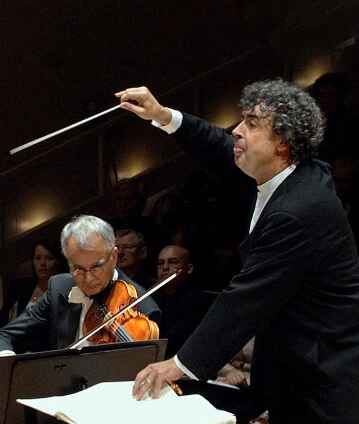Semyon Bychkov conducts Richard Strauss’s “Alpine Symphony”

Perhaps the most spectacular climax in orchestral literature occurs when the summit is reached in Richard Strauss’s Alpine Symphony. Overwhelming impressions of nature and instrumental virtuosity also characterize the other scenes of the work, which Semyon Bychkov conducted here with the Berliner Philharmoniker. Composer Detlev Glanert also made his Philharmonie debut at this concert with his Theatrum bestiarium.
The Russian conductor Semyon Bychkov has been one of the orchestra’s close artistic partners for many years, and Herbert von Karajan considered him one of the greatest talents of the next generation. One of Karajan’s favourite compositions was heard during this concert – Richard Strauss’s Alpine Symphony, which Karajan conducted with the Berliner Philharmoniker in 1982; it was the first commercial CD release, with a legendary recording of the work. The choice of this tone poem for the new digital medium is not surprising, since the instrumental virtuosity and wealth of harmonic colours in Strauss’s last symphonic poem demand the utmost of every orchestra. The composition, which was inspired by Friedrich Nietzsche, depicts a day in the mountains, during which a solitary wanderer is confronted with overwhelming impressions of nature – until perhaps the most spectacular pinnacle of orchestral literature is reached at the summit.
The Roman Emperor Caligula, whose reign spanned the years AD 37 to 41, was already considered by ancient historians to be the epitome of an unscrupulous tyrant. During the 20th century, writers and film-makers have recognized a forerunner of contemporary dictators like Stalin and Hitler in the brutal emperor, who himself was the victim of murder. In the 1930s the young Albert Camus wrote a play entitled Caligula that is still staged regularly today, which composer Detlev Glanert and his librettist Hans-Ulrich Treichel used as the basis for their opera of the same name, premiered in Frankfurt in 2006. As in other cases, Glanert also used material from the opera for an orchestral work. The evocative composition, entitled Theatrum bestiarum, is dominated by tremendous sound masses and powerful organ chords as well as moments of ominous calm, grotesque dance sequences and echoes of tonality. This work is the first composition by Glanert to be performed by the Berliner Philharmoniker.
© 2008 Berlin Phil Media GmbH
Artists
Our recommendations
- Semyon Bychkov and Kirill Gerstein
- Works by Dmitri Shostakovich and Arnold Schoenberg with Semyon Bychkov and Guy Braunstein
- Semyon Bychkov and Menahem Pressler
- Semyon Bychkov and Gautier Capuçon
- Semyon Bychkov and Katia & Marielle Labèque
- Semyon Bychkov conducts Mahler’s Fourth and a new work by Larcher